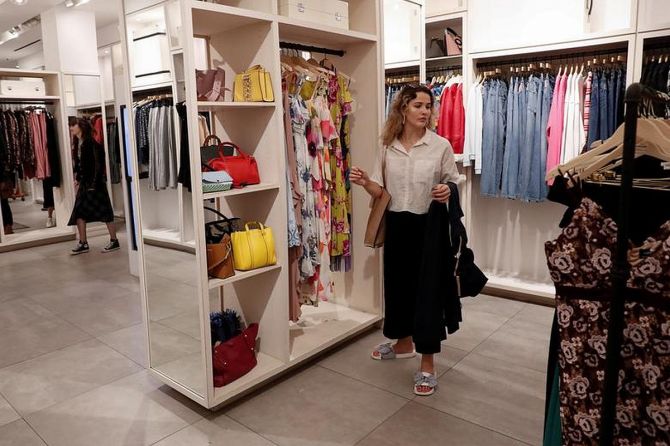Led by Trent, which hit its lifetime-high recently, apparel retailers have gained between 10 per cent and 36 per cent over the past three weeks.
Given the network of physical stores, these stocks shall be major beneficiaries of the unlock theme, with most states doing away with Covid restrictions.
Amid improving footfall, analysts expect the sector to post double-digit growth in FY23.
This, coupled with improving margins on the back of higher volumes, cost rationalisation, higher private label sales, and lower debt, is the trigger and expected to sustain the rally.
After muted demand trends in the early part of the March quarter (Q4FY22) because of a fresh Covid wave, sales have seen a quick recovery, especially in March.
The improvement in the situation was led by easing restrictions, the return-to-office trend, and higher footfall at malls.
For FY22, revenues of brick and mortar apparel retailers are expected to grow 20-25 per cent, after declining 40 per cent in FY21 because of Covid-19.
While the unlock process and pent-up demand have helped, market share gains, price hikes, expansion, and omnichannel presence are the factors that have led to revenue expansion for listed retailers.
Jitendra Upadhyay, senior equity research analyst at Bonanza Portfolio, says: “After the sharp recovery, healthy performance from all segments in the sector is expected in Q4FY22.
“This will boost revenue to more than 60 to 65 per cent of the pre-pandemic level. Revenue is expected to record healthy double-digit growth in FY23 as well, on sustained footfalls.”
Market share gains and higher contribution from non-physical stores were the key gains over the last two years and this could continue going ahead.
Akhil Parek and Kevin Shah of Centrum Research say: “During the pandemic many of the small retail outlets had to shut their operations which benefitted bigger, cash-rich, branded retailers.”
While retailers have been aggressive in expanding their physical retail footprint, what could add to their revenue growth is the omnichannel presence, with its share moving up from low single digit before the pandemic to high single digit, now.
The other positive is improving profitability.
Anuj Sethi, senior director, CRISIL Ratings, says: “Apparel retailers, which could barely break-even previous financial year, should log an operating margin of 5-7 per cent in FY22, against 9 per cent before the pandemic — backed by improving operating leverage, continued cost rationalisation, and prudent inventory management.”
Analysts expect companies to maintain this trend despite the expansion and reversal of certain expenditure, such as employee costs, rentals, and advertisements.
CRISIL Ratings expects the sector to grow by 8-10 per cent in FY23, as well on sustained footfall and waning impact of the pandemic, though it shall still be lower than the pre-pandemic level.
The growth outlook (on a high base) bodes well for the listed retail apparel pack that posted a 42-88 per cent YoY growth for M9FY22.
Higher revenue growth and margins translated into improved bottom-lines.
After posting losses in M9FY21, listed retailers turned the corner this year (M9FY22).
Among companies in the listed space, Page Industries benefited from the surge in demand for the leisure segment, and there can be some moderation going ahead.
However, Bonanza Portfolio expects the company to outperform, with growth coming from kids wear, athleisure, and rural penetrations.
The management remains optimistic about maintaining margins of 20-21 per cent.
Brokerages are also positive on Trent, given its industry-leading same-store sales growth and operating profit margin.
The company is undertaking an aggressive store expansion to capture a bigger share of the fast/value fashion pie through Westside, Zudio, and Utsa.
The improving trajectory of Star Bazaar, coupled with better traction in Zara, should also aid growth over the medium term, says Systematix Research.
For ABFRL, in addition to market share gains from popular brands, such as Louis Philippe, Allen Solly, Van Heusen, and Peter England, the company is gaining traction in ethnic wear (by partnering with major designers) and the athleisure/ sportswear segment with the acquisition of Reebok brand.
The company is also foraying into the direct-to-consumer space and is developing a portfolio of digital brands across categories.
But the recent rally meant that current prices have exceeded the target prices of these companies, barring ABFRL.
Investors should await a meaningful correction before taking exposure to these stocks, which are trading at 50-100 times their FY24 earnings estimates.
Source: Read Full Article

